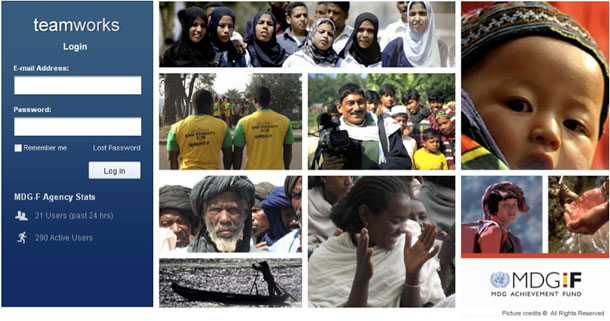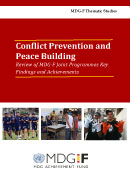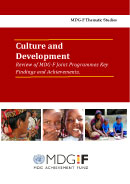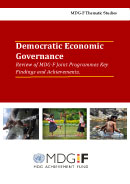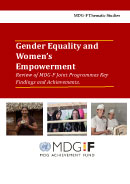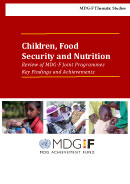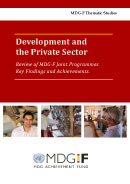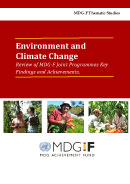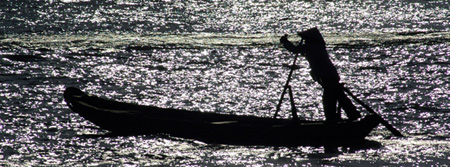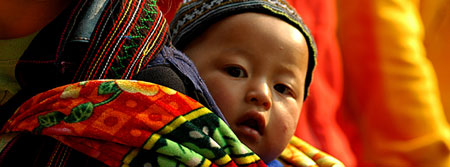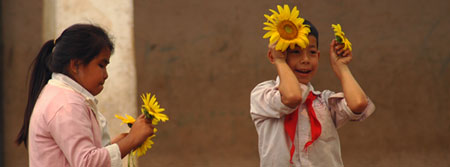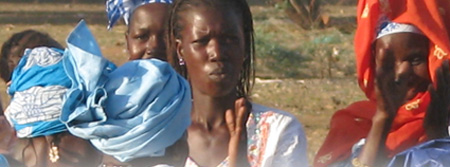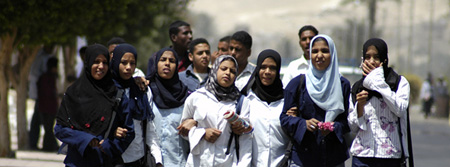

MDG-F Role in Knowledge Management
The MDG-F Secretariat, based in the UNDP Headquarters in New York, is responsible for the Monitoring and Evaluation of the Joint Programmes it funded as well as the management and dissemination of the insight gained from its work.
Regional workshops, each of which gathered more than 200 representatives from the UN System and national counterparts to discuss, at a technical and political level, the experience of the MDG-F programmes in progressing toward the MDGs. These discussions focused on the modality of interagency implementation with strong leadership of the national governments.
-
Latin America Regional Workshop, Cartagena 2009, 2011
-
Africa, Arab States, Asia and Eastern Europe Regional Workshop, Casablanca 2009, 2011
Community of Practice for the MDG-F programmes and their partners through the virtual platform Teamworks. This tool was developed to store and share knowledge, experiences and lessons learned, for use by UNDP core and project staff, staff from participating UN entities and, by invitation, all national counterparts and beneficiaries of the MDG-F Programmes. The platform allows for a range of activities, from sharing files and videos securely to participating in online discussions and disseminating press-releases, newsletters, publications, etc.
Peer-to-Peer Exchange Initiatives: the Fund promoted the direct exchange of knowledge and experiences between programmes through country visits.
- Field visits between countries. Joint Programme teams had the opportunity to learn from each other’s experiences and apply lessons learned (e.g., staff from the Bolivia peace building programme visited the Colombia peace building programme).
- Regional workshops
- Experiences exchange workshops: e.g. staff from Ecuador and Peru attended a UN Habitat regional workshop in Brazil 2012; Guatemala hosted a workshop on National Water Funds in July 2012 that brought together government officials and experts from Honduras, Guatemala and Nicaragua.
- South-South technical cooperation through technical assistance (e.g. Peru supported Paraguay with the reformulation of the Joint Programme on Water Governance).
Online Library, with more than 500 publications produced by MDG-F Joint Programmes and our research partners. This resource was created to ensure proper dissemination of the good practices and lessons learned of the MDG-F.
Support to UNDOCO in updating the new UNDG Joint programming implementation guidelines by bringing the MDG-F's expertise and tools to the process. The UN Development Operations Coordination Office (DOCO) promotes social and economic progress by helping UN organizations deliver coherent, effective and efficient support to countries. The Secretary-General created DOCO (formerly the Development Group Office) and the UN Development Group (UNDG) in 1997 to unite the UN system and improve the quality of its development assistance.
Studies and discussion papers
- A series of 8 thematic window development results reports:
- From Global Agenda to National Action. Intersectoriality, national ownership and ¨ONE UN¨: The MDG Achievement Fund at Work. A discussion paper based on the MDG-F's multi-country experience in translating the global agenda into national action.
- An Evidence-based Review of MDG-F Experiences to Date: A Contribution to the QCPR Process. Submitted in April 2012. The quadrennial comprehensive policy review (QCPR) is the primary policy instrument of the General Assembly to define the way the UN development system operates to support programme countries in their development efforts.
- MDG Achievement Fund Lessons Learned. Presented at the IV High Level Intergovernmental Conference on Delivering as One, Montevideo Uruguay, 8-10 November 2010.
Capacity building: The MDG-F Secretariat, in its final phase before closure, translated its repository of information and knowledge into active training by developing thematic training modules in partnership with various international organizations and academia institutions. These modules sought to crystalize the lessons learned by the MDG-F s and to ensure the continued dissemination of this knowledge beyond the MDG-F’s lifetime.
- The Secretariat contributed to international discussions, such as the Post-2015 thematic consultation. A grant of $ 2 million was given to support the UNDG’s thematic and national consultations on the future of the Post 2015 Development Agenda. In addition, a special effort was made to disseminate lessons learned and best practices in two areas that have gotten the most interesting and innovative results: Food and Nutrition Security and Environmental Sustainability with emphasis on water issues. Finally, we participated as members of the steering group of the thematic consultations of Food and Nutritional Security, Environmental Sustainability and Inequalities.
- Development of discussion paper for the Post 2015 e-thematic consultation on environmental sustainability:
-
Food Security and Nutrition inter-window Workshop, Madrid, 2013. Building on the work of the Millennium Development Goals Achievement Fund (MDG-F) on food security and nutrition, the MDG-F Secretariat organized a two-day Workshop in March 2013, in Madrid, hosted by the Government of Spain.
This workshop resulted in: 1) South-South Cooperation and exchange of knowledge promoted, 2) Brief policy paper on the MDG-F Key findings that had an important impact on enriching the discussions and final report of the ng High Level Panel of Post 2015 Foods Security Thematic Consultation hold on the 4th of April in Madrid, Spain.
The objectives of the Workshop were the following:- Share the lessons learned from the experience of the MDG-F and articulate how they can support the five priorities of the "Zero Hunger Challenge",
- Discuss the experience of the MDG-F with relevant experts from international organizations, academia and civil society, as well as partners involved in the management of MDG-F Joint Programmes, with a focus on the following topics: i) Governance; ii) Rural Development and Empowerment; iii) The combination of short-term interventions and long-term strategies;
- Give visibility to and raise awareness of the outcomes of the MDG-F in Spain, by showcasing some of the key achievements of the Joint Programmes supported by the MDG-F.
